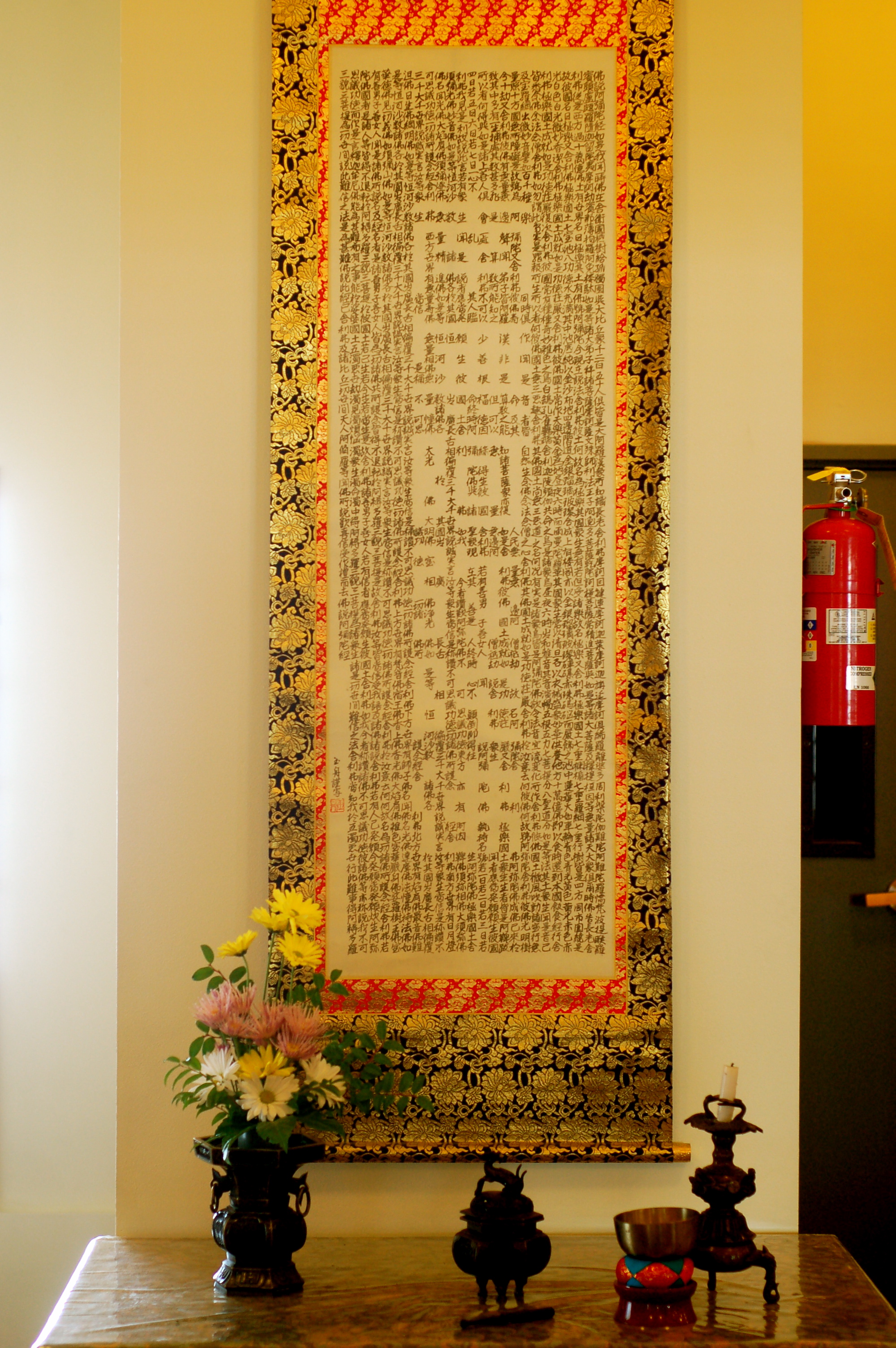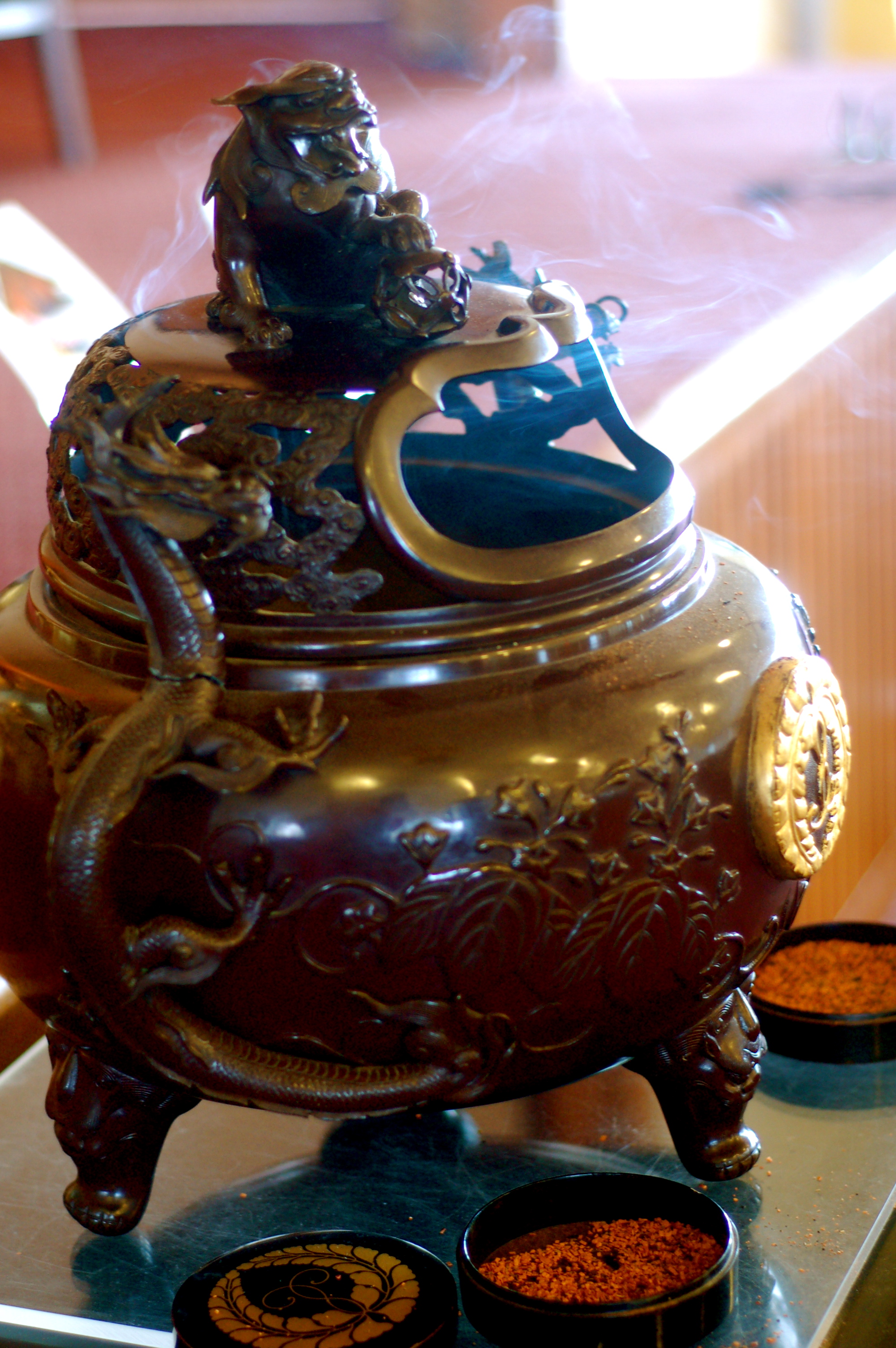Sometimes coincidences transpire so fortuitously that they cause you to question your disbelief in God: little events that deliver just what you need, when you need it, neatly packaged as a can of chicken soup for the soul. This Sunday’s trip to the Oregon Buddhist Temple was just one of those occasions. It couldn’t have come at a better time. Here’s the story.
The next day after that visit, with Buddhalicious thoughts still ringing in our ears, on Monday, Valentine’s Day, Amanda and I officially launched this blog, sending out invitations to our friends and acquaintances to come pay a visit our new “love child.”
They responded—in gangs, posses and droves. A few of them also left behind a trail of comments so blisteringly angry that our launch may one day go down in history as the Valentine’s Day flame war.
Apparently, a couple of people felt that Amanda’s A. M. E. Zion Church post, in which she expressed her love for the church and for me, was an act of racism. Okayyyyyyy. One or two of them were anonymous trolls imported from Amanda’s other blog who have made a hobby of leaving nasty messages and whose opinions hardly matter, while the other was a friend of mine in my offline life whose opinions do. By way of reply, the authors of this blog, including yours truly, pushed back. Hard. Regrettable words were uttered on all sides. And when the digital dust had settled, friendships were strained to the point of breaking.
Which brings me to the subject of Buddhism. The third of the Buddha’s eightfold path, right speech, involves more than just getting your facts straight. It also means avoiding divisive or abusive language—along with getting your timing right. For instance, there’s not a lot of point in telling your skydiving partner that his fly is open right after you’ve jumped.
Though I’d studied Buddhism a couple of years ago, for whatever reason thoughts about right speech were on the top of my mind as Amanda and I attended last Sunday’s service. Mind you, the service itself had nothing to do with that. But the incense, chants and the gilt figurines brought a lot of what I already knew about Buddhism back to mind. Unfortunately, as the fog of the following day’s flame war descended, I forgot that wisdom.
But on to the service itself.
Established in 1903, the Oregon Buddhist Temple is the oldest Buddhist organization in the state. If you’re looking for long stretches of meditative silence, this isn’t the place for you. On the other hand, if you don’t know a lick of Japanese outside of what you might learn at a sushi bar, there’s plenty to sink your teeth into here. As a branch of Buddhism known as Jodo Shinshu, the Oregon Buddhist Temple offers no meditation or chanting in dead languages. The chants are all in Japanese, and, out of the two-hour service, about a quarter of it was spent singing or chanting in Japanese. Here’s where I had trouble. Looking around the congregation of about 50 people (it was a low-attendance day—apparently the rest of the flock were away at a convention), maybe three people looked like they could have actually understood the language. In my observation, there’s something oddly incongruous—if not inauthentic—about a roomful of English-speaking people chanting in a language they don’t understand. I get the thinking behind it. Some claim that the mere sound of the chant in the original language is supposed to have spiritually salubrious effects, but I don’t buy it.
On the other hand, I fully bought into the way children were included in the service. The minister brought all the children to the front of the auditorium and read them a picture book about a crocodile that kept biting the other jungle animals in the ass. I think the message had something to do with non-retaliation, or something else equally Buddha-ish. First off, the minister talked to the kids with dignity and respect, not condescendingly at all. Lotsa points there—yes, Pillsbury Dough Boy minister at the First Christian Church, I’m looking right at you. Secondly, if kids have to sit through a boring (for them) adult church service, it’s only fair that their elders sit in respectful silence while the kiddos get a little something just for them.
After another Japanese hymn or two came the sermon proper. A lay minister took the lectern and held forth for about an hour on the history of Native American peoples in the greater Portland area. For starters, you might be curious to know that the Multnomah tribe lived on Sauvie’s Island, while the Clackamas people lived in what is now southeast Portland. Makes sense. She also spoke about how Lewis and Clark traded with the inhabitants of Sauvie’s Island, who afterward escorted them up the river in a ritual that neatly combined hospitality with pointed dismissal from the neighborhood.
Sadly, by 1856, the population of these original dwellers was decimated by diseases such as small pox, influenza and, oddly enough, malaria (all of which were likely brought in from the carpetbagging explorers); the remaining few were rounded up and deported to nearby reservations.
Although I grew up in Portland, somehow this whole history had eluded me. Yet, in an immediate way, it was a more relevant history lesson than any study of the Roman emperors could ever hope to be. Except for a meager handful of descendants and a few scraps of leather and beads, those early inhabitants of my neighborhood are all but gone. Yet they shaped this land and exerted a tremendous influence on the white founders of this region. The question raised in the sermon had to do with karma and the concept of the interconnectedness of all things across time. Because those people are gone almost without a trace, it’s hard to tell what kind of karma connection we have with them; Buddhism nevertheless insists there is a strong link. That’s too bad, because I’m willing to try that belief on for size.
The law of karma maintains that we are all connected—no exceptions. That interconnectedness includes people of all races and sexual orientations of course—but that’s the easy part (at least, in theory). What’s more difficult to accept is the idea that I’m also connected to people like Hosni Mubarak, Ke$ha and the writers of some of the more spiteful comments on this blog.
In our commenting forums, I didn’t choose my words or their timing as carefully as I would have liked—though I don’t retreat one pixel from the points I was trying to make. Maybe church this Sunday will give me just what I need to get my karma in order.


